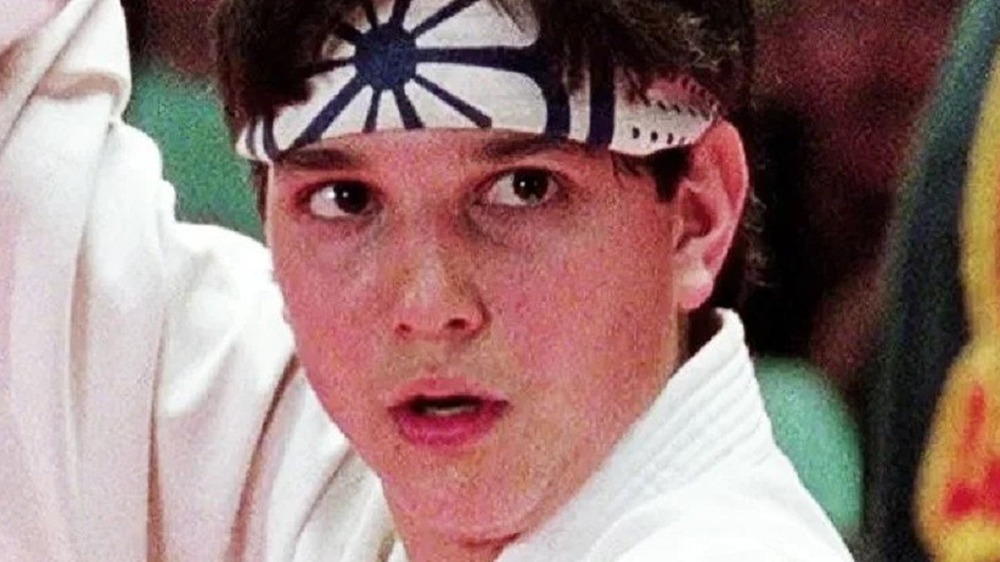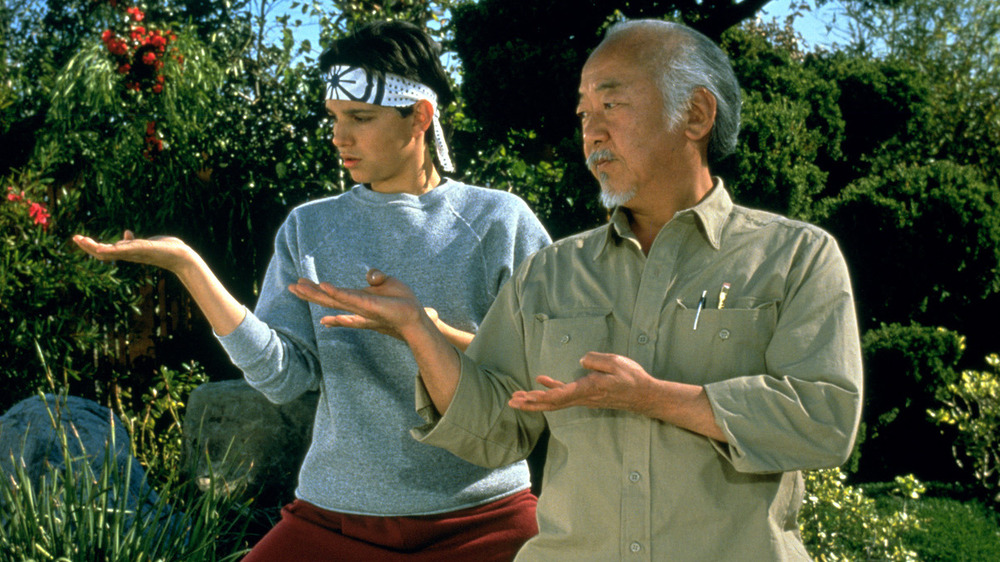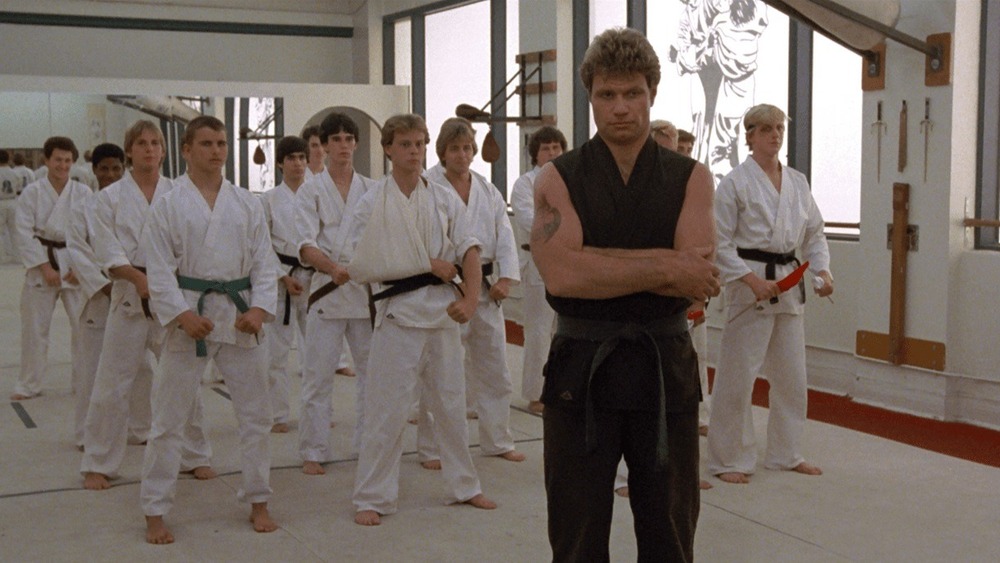The Surprising Origin Behind The Karate Kid And Cobra Kai
When The Karate Kid was released in 1984, it's safe to say that nobody expected the flick to spawn a franchise that would still be going strong over three decades later. The story of Daniel LaRusso (Ralph Macchio), a good-hearted teen who learns karate from his apartment building's deceptively wise maintenance man Mr. Miyagi (the late Pat Morita) after running afoul of a group of local bullies, was barely expected to make a dent in the box office. It was released during a summer which saw such classics as Indiana Jones and the Temple of Doom, Ghostbusters, and Gremlins hit the screen. It featured a cast of largely unknown young actors, and in the "wise old mentor" role was an actor best known for his comedic turn as diner owner Arnold in the sitcom Happy Days. But the flick struck a major chord with audiences thanks to the naturalistic performances of its young cast, sharp direction from John G. Avildsen (who owned a Best Director Academy Award for Rocky), and a screenplay by up-and-coming scribe Robert Mark Kamen, which must rank among the greatest commercial scripts ever written.
The film was a surprise smash hit, and it generated three sequels (1986's The Karate Kid Part II, 1989's The Karate Kid Part III, and 1994's The Next Karate Kid), a reboot (the 2010 Jaden Smith-Jackie Chan vehicle The Karate Kid), and a television series (Cobra Kai) which, three seasons in, has firmly cemented its status as one of the best serials running. Particularly given the Avildsen connection, casual fans could be forgiven for thinking that the original film was simply a remix of Rocky, and in an oral history of the film for Sports Illustrated, Kamen shared that the film's writer and star Sylvester Stallone has joked with him about The Karate Kid being a "rip-off" of his movie. If that is so, however, it would be a neat trick — because Kamen based his screenplay, his first solo project to actually be produced, on his own life.
Robert Mark Kamen was the real karate kid
Kamen shared with Sports Illustrated that as a teenager, he'd been jumped by a gang of bullies and beaten up after a night at the 1964 New York World's Fair. With his pride bruised, he decided to take up karate for self-defense — but his first teacher turned out not to be a good fit. A former Marine captain, the man had an aggressive style focused on...well, striking first, striking hard, and having no mercy, and while his tutelage might have helped Kamen get back at his bullies, it left him feeling like he was missing a true connection to the art.
After earning his first black belt, Kamen sought out a different style of karate, one more centered on defense — on turning an attacker's aggression toward them, with a smooth, fluid system of blocks complemented by surgical counter-strikes. The style of karate he would eventually come to master, an Okinawan style called Gōjū-ryū, was invented by a legendary sensei who created it by blending traditional Okinawan forms with elements of Chinese kung fu. This man would directly mentor Kamen's sensei, so it's pretty likely that Kamen heard his name many, many times over his years of training: Chōjun Miyagi.
Kamen explained to SI that his mentor in the film business, then-Columbia Pictures chairman Frank Price, had come to him with the germ of an idea for a story: a newspaper article, which had actually been optioned for a potential feature by Columbia, about a 9-year-old boy who had earned a black belt after being picked on in his neighborhood. In a subsequent conversation with the producer who had discovered the article, the legendary Jerry Weintraub, the seed which would grow into The Karate Kid began to germinate. "Jerry asked if I had a story to wrap around this [article]," Kamen remembered. "I came out to L.A. and told him about me and my own teacher. My life informed it."
Kamen's teachers influenced The Karate Kid's dojos
Serving as Miyagi's diametric opposite in the Karate Kid franchise is John Kreese (Martin Kove), the infamous head of the Cobra Kai dojo. He trained Daniel's bullies and would go on to become a thorn in Daniel's side decades later, during the events of Cobra Kai, by resurfacing to spread his corrupting influence among a new generation of young karate students. In a 2021 conversation with Uproxx, Kamen shared that his first sensei, the hard-nosed Ed McGrath, was at least as much of an influence on the character of Kreese as the real Miyagi was on his fictional counterpart — and to illustrate the point, he related the entertaining story of how he got his first black belt.
"[McGrath] took me to a bar one night... with my friend, Dennis, and him. Dennis was my training mate, and he insulted some construction worker by hitting on his girlfriend," Kamen remembered. "And then he just turned to me and said, 'Mr. Kamen, dispatch this man.' The next thing I knew, we were in a bar fight, and we were punching and kicking ... Finally, we leave the bar, and he took me to the trunk of his car, had me kneel down in the parking lot, and gave me my black belt."
Kamen clarified that while McGrath was "very tough, but he was very charming," there were creative liberties taken in creating the character of Kreese, who is simply "an over-the-top lunatic." Likewise, while he never met the real Miyagi, the sensei's philosophy greatly informed the fictional Miyagi's approach to life, karate, and even training. Referring to Miyagi's famously chore-heavy method of training Daniel, Kamen said, "Wax on, wax off is actually a real block. Paint the fence is actually a blocking system. Sand the floor is actually a blocking system." So, was Kamen himself trained by way of hours of tedious labor? Yeah, not exactly. "I just made that [training method] up," he said. "I am in the make-s**t-up business. That's what I do."


